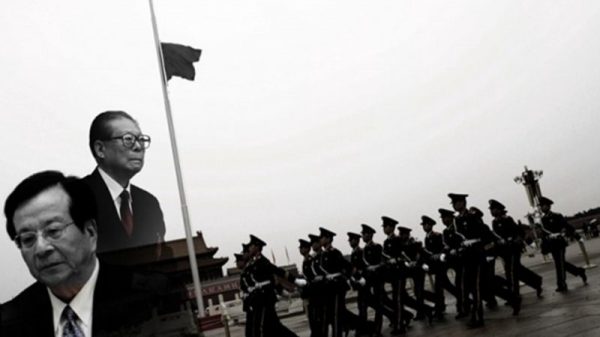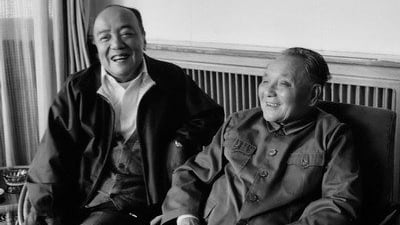[ad_1]

Jiang Zemin and Zeng Qinghong. (Image source: Internet synthesis)
Zeng QinghongyesJiang ZeminThe second most powerful person in the era, he was known as Jiang’s “big internal manager.” Jiang’s series of perverse actions after taking power are all blamed on Zeng Qinghong’s planning and promotion. Former Chairman of the Communist Party of China Yang ShangkunBeijing 301 HospitalHe died under mysterious circumstances, and it was reported that he was also conspired by Jiang Zengassassination.
In 1989, Jiang Zemin rose from the position of Secretary of the Shanghai Municipal Party Committee to the highest peak of the CCP’s power, riding on the blood of the “June 4th” students. When Jiang Jinjin became the General Secretary of the Communist Party of China, the only request he made to Yang Shangkun and Li Peng was to bring Zeng Qinghong to Beijing to serve as deputy director of the General Office of the Central Committee of the Communist Party of China.
Yang Shangkun and Li Peng agreed to his request. Why didn’t Jiang Zemin bring Huang Ju, who was more trusted by him, to Beijing, but why did Jiang Zemin choose Zeng Qinghong to accompany him? According to sources, there are two most critical factors:
1. The fate of the first two general secretaries Hu Yaobang and Zhao Ziyang made Jiang Zemin timid, and he was not familiar with the situation in Zhongnanhai. Compared with Hu Yaobang and Zhao Ziyang, Jiang has less seniority in the party. A slight mistake may lead to a more tragic ending than Hu Zhao.
2. The power of the CCP is still controlled by veterans such as Deng Xiaoping, Chen Yun, and Li Xiannian. Yang Shangkun and Bo Yibo are still involved in the decision-making of the CCP’s highest affairs and have a decisive say. In addition, Jiang Zemin was at a loss as to how to handle the relationship between Li Peng, Qiao Shi, and Yao Yilin.
If Huang Ju could at most help Jiang Zemin share some daily affairs, but Huang Ju came from the grassroots level and had been working in Shanghai for a long time. He did not understand the situation in Zhongnanhai and could not expect him to make suggestions. Therefore, the first thing Jiang Zemin thought of was Zeng Qinghong. Jiang Shen was well aware of Zeng’s political skills, and at the same time wanted to rely on the Zeng family’s political resources and the connections Zeng had established in Beijing.
In 1992, Zeng Qinghong, as Jiang Zemin’s main adviser, played a key role in Jiang Zemin’s consolidation of power and the purge of Yang Shangkun and his brother Yang Baibing, and at the same time gained political capital for himself.
Zeng Qinghong also assisted Jiang to successfully arrest Chen Xitong, forced Qiao Shi to step down, and made suggestions to weaken Li Peng’s power. She also promoted and re-appointed Zhou Yongkang to Jiang Zemin’s continued persecution of Falun Gong. In addition, Hong Kong media claimed that he had repeatedly made suggestions for the assassinations of Hu Jintao and Xi Jinping.
It can be said that Jiang Zemin’s series of perverse actions after taking power were the result of the planning and promotion of military adviser Zeng Qinghong.

Jiang Zemin and Zeng Qinghong drove a wedge between Deng Xiaoping and brothers Yang Shangkun and Yang Baibing. The picture shows Yang Shangkun and Deng Xiaoping. (Internet picture)
Popular rumors: Yang Shangkun was assassinated by Jiang Zemin and Zeng Qinghong in conspiracy
In the autumn of 1998, Yang Shangkun, who had no serious health problems, died suddenly after being admitted to the 301 General Hospital due to a cold. It was widely rumored that Yang Shangkun was assassinated by Jiang Zemin and Zeng Qinghong.
Information shows that Yang Shangkun served as Chairman of the Communist Party of China, member of the Political Bureau of the Communist Party of China, Vice Chairman and Secretary-General of the Military Commission of the Communist Party of China. He was one of the “Eight Elders of the Communist Party of China” during Deng Xiaoping’s administration and one of Deng Xiaoping’s supporters.
According to reports, Jiang Zemin and Zeng Qinghong conspired to drive a wedge between Deng Xiaoping and brothers Yang Shangkun and Yang Baibing. The Yang brothers were deprived of military power at the 14th National Congress of the Communist Party of China. In October 1992 and March 1993, Yang Shangkun resigned from the Politburo, Military Commission and President of the country successively. In 1993, Yang Baibing also officially retired as director of the Military Political Department.
Du Daozheng, the president of “Yanhuang Chunqiu” magazine, disclosed in his book that Yang Shangkun and Jiang Zemin had long had differences when Deng Xiaoping came to power. At that time, Deng Xiaoping did not let Jiang Zemin step down in order to prevent the “June 4th” issue from being raised after his death. After Deng Xiaoping died, Yang Shangkun stepped down.
Former General Secretary of the Communist Party of China Zhao Ziyang also stated in his book that Deng Xiaoping’s speech during his southern tour and two speeches at Shougang showed that Deng Xiaoping was very dissatisfied with Jiang Zemin and that Deng wanted to solve Jiang Zemin’s problems.
During that period, Jiang Zemin was very uneasy and stopped a lot of work. Therefore, Yang Shangkun and Wan Li mistakenly believed that Deng Xiaoping wanted to replace Jiang, so they made the decision to form an advisory group of the CPC Central Committee headed by Yang Shangkun to replace Deng as the “supreme authority” after his death.
The book says that at the last moment, Deng Xiaoping weighed the pros and cons and did not touch Jiang Zemin in order to prevent the “June 4th” issue from being liquidated. Yang Shangkun miscalculated and stepped down. In addition, Yang Shangkun had no respect for Jiang in the past, so he was in a miserable situation later.
The book “Jiang Zemin: The Man” reveals that Yang Shangkun has always been dissatisfied with Jiang Zemin’s misdeeds in the army. He often scolded and accused Jiang Zemin at gatherings of veteran cadres. After Jiang and Zeng Qinghong conspired to remove Yang from power, Jiang felt guilty, while Zeng Qinghong believed that Yang Liuzuo was a charlatan after all. Troublesome, but it was not appropriate to take action while Deng Xiaoping was alive.
After Deng Xiaoping’s death in February 1997, Jiang Zemin was worried about Yang Shangkun’s influence in the military and decided to use the military’s 301 General Hospital to get rid of Yang Shangkun. In the autumn of 1998, 301 General Hospital was completely controlled by Jiang Zeng. At that time, Yang Shangkun was admitted to the 301 General Hospital due to a cold. He died suddenly in the early morning of September 14, 1998. There were widespread rumors that Yang was killed.
The book says that Jiang Zemin regarded the renovation of 301 General Hospital as a major problem because many senior members of the CCP looked down upon the immoral and incompetent Jiang Zemin and did not take him seriously, but Jiang had no choice. However, Jiang Zeng saw one thing clearly, that is, when people get old, they will always get sick, so he thought of using hospitals to please the CCP elders and control the lives and deaths of these people.
Editor in charge: Fang Cha
Short URL:
All rights reserved. Reprinting in any form requires permission from this site. It is strictly prohibited to create mirror websites.
[Honorary Members Wanted]Streams can merge into the sea, and small kindnesses can achieve great love. We sincerely recruit 10,000 honorary members from Chinese people all over the world: each honorary member only needs to pay a subscription fee per year and become an honorary member of the “Look at China” website, which can help us break through censorship and blockade and provide services to at least 10,000 mainland Chinese compatriots. Provide independent and true key information to warn them in times of crisis and save them from pandemics and other social crises.






